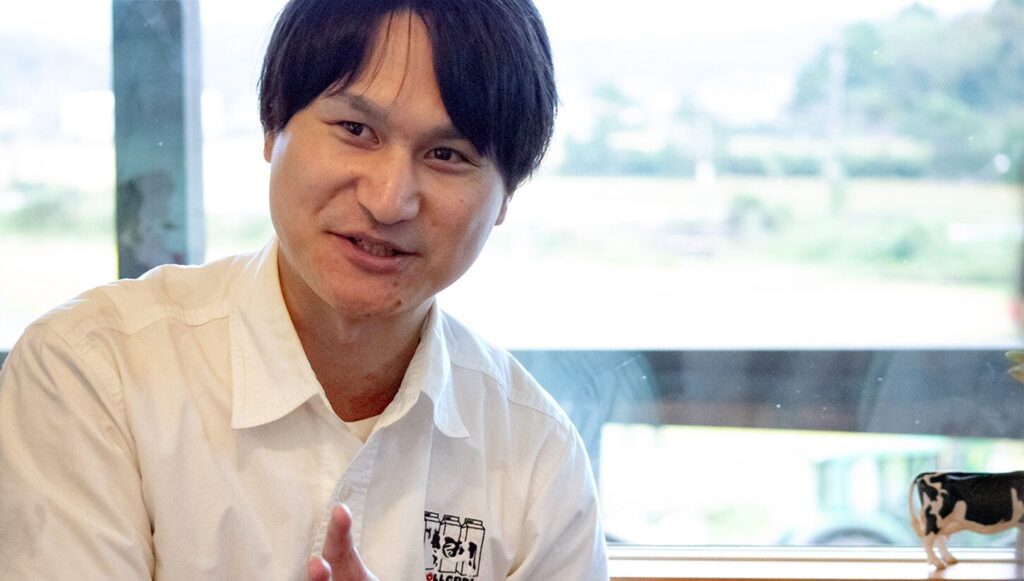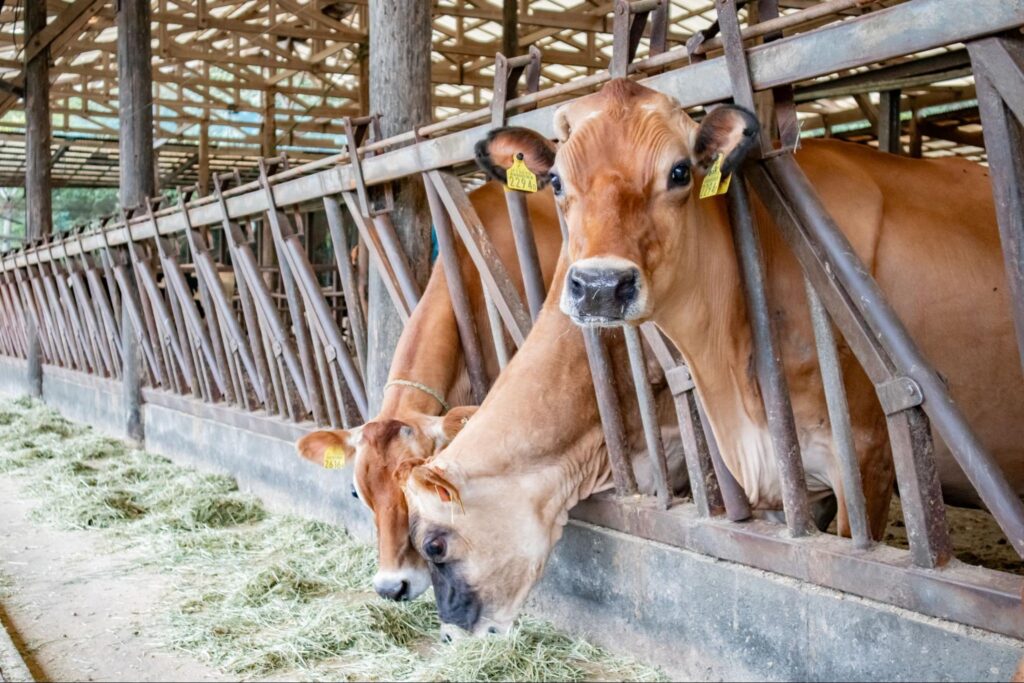Agriculture
03/21/2025
Sudo Farm is setting a new standard for livestock farming—one rooted in care for animals, people, and the environment. Located in Tateyama City, Chiba, the farm operates with a deep respect for nature and a strong commitment to sustainability, working toward a future where animals, communities, and the planet can flourish together.
In the first part of the interview, we shared the story of Kenta Sudo, CEO Sudo Farm, highlighting their current efforts to minimize environmental impact. In the second part, we’ll explore the sustainability report that Lively and Sudo Farm plan to create together and discuss the future of dairy farming.

Kenta Sudo
CEO, Sudo Farm
Kenta Sudo is deeply committed to sustainable dairy production and fostering meaningful connections between agriculture and the local community.
As the CEO of Sudo Farm in Tateyama City, Chiba, he leads efforts to implement environmentally sound livestock management practices while maintaining exceptional standards in milk production.
Since joining the family business in 2013, Kenta has been actively involved in every facet of the operation, including dairy cattle breeding, milk processing, product development, direct-to-consumer sales, and financial management. In 2019, he initiated the Fresh Milk Shake Festival, an annual event celebrating the farm’s premium milkshakes made with ice cream crafted from their own dairy products. In 2025, Kenta earned certification as a Small and Medium Enterprise Management Consultant, further enhancing his expertise in business operations.
As CEO, Kenta leads the farm’s strategic decision-making, organizational growth, and operational efficiency while preserving the sustainable farming practices and traditions that have been carefully cultivated by his family for generations.
Absolutely! Methane-Reduced Milk caught the attention of both researchers and the media. I still remember the excitement I felt when Lively reached out to me. From the very beginning, I had hoped this product would connect me with like-minded professionals like you.

The inspiration came from Pizza 4P’s, the Italian restaurant we currently supply with dairy products. I was deeply impressed by the impact of their sustainability report—the way they transparently shared both their successes and challenges, backed by clear data and meaningful insights, really stood out to me. It made me realize the power of thoughtful reporting in driving positive change.
We supply our milk to Pizza 4P’s, where guests can enjoy cheese made from our fresh dairy production. Right now, we’re also collaborating with them to establish a cheese processing facility on Sudo Farm’s premises. Expanding beyond milk production into cheese-making has given us new opportunities to enhance our sustainability efforts and further reduce our environmental impact.
* Pizza 4P’s is a restaurant chain from Vietnam, founded in 2011 by two Japanese entrepreneurs. The name stands for Peace, Proactive, Professional, and Passion—values that define their approach to food and hospitality. Known for crafting their own fresh cheese and sourcing local ingredients, they blend quality with sustainability. With 32 locations across Vietnam, Cambodia, India, and Japan, Pizza 4P’s continues to bring delicious flavors while staying committed to environmentally conscious practices.

That’s exactly right. When I first took over the farm, my motivation came purely from my passion for cattle husbandry. But when I looked at the financial records, I felt completely defeated—like passion alone wasn’t enough to keep things running. It was a tough realization, but understanding that “passion alone can’t sustain a business” became one of the most valuable lessons I’ve learned.
I believe that environmental and sustainability efforts will only grow in importance for businesses. With this report, I want to present a clear and tangible vision—something more than just abstract ideas—while showcasing our progress in a way that’s easy to understand.
I also hope it helps us connect with consumers who genuinely care about sustainability. What I truly appreciate about the team at Lively is how they take the time to understand things firsthand, and that makes me even more excited to collaborate on this report together.

I think one of the biggest challenges is changing how consumers perceive the value of milk and dairy products. For example, if you see milk priced at 1,000 yen per liter in a supermarket, it might seem expensive. But even at that price, it wouldn’t make a significant difference in improving the situation for the dairy industry in Japan. That’s why I believe we need to create new value and explore innovative business models to ensure a sustainable future for dairy production.
Lately, we’ve been putting a lot of thought into truly understanding what consumers want. In the past, we believed that simply offering delicious milk was enough to make customers happy. But now, we’re taking it a step further—what if our milk isn’t just delicious, but also supports better health and helps reduce medical costs? By shifting our perspective this way, I believe our products can resonate with people who see them as an investment in both their well-being and environmental sustainability.
We’re also exploring new ways to enhance value, such as introducing membership programs. Through this process, I’ve come to realize that success in dairy production isn’t just about efficient production and high-quality processing—we also need to invest in logistics and sales strategies to connect with consumers in more meaningful ways.

I genuinely love cattle—I think they’re incredibly special animals. That’s why I want to create an environment where dairy farming is not only more efficient but also more enjoyable for them.
Right now, we’ve started measuring cortisol levels in our herd. Cortisol, often called the “stress hormone,” increases when livestock experience stress. Elevated cortisol levels can impact milk composition and quality, so ensuring a low-stress environment benefits both the animals and the people who consume their milk.
My goal is to develop a stress-free, well-being-focused dairy farming model—one that prioritizes the health and happiness of the cattle while delivering the best possible products to consumers.
Yes! We’re launching a membership program for people who want to support a sustainable dairy farming model—one that prioritizes both environmental responsibility and animal well-being. Right now, we share updates about the farm just once a year, but in the future, we want to give members a closer look at how their support helps create better living conditions for our cattle, strengthens the local community, and preserves nature and biodiversity.
We’ve also introduced a cow sponsorship program, where participants can name and follow the journey of an individual animal. The first heifer named through the program is now about 1.8 years old and is expecting her first calf soon. Looking ahead, I’d love to start conversations about how we care for cattle as they age and what the best approach is for their long-term well-being.
The first time I saw cattle being sent away, I was in first or second grade. I remember feeling shocked when I learned that dairy cows, who could have lived for several more years, were culled for meat due to declining milk production and other factors. It was heartbreaking—everyone was sad, yet it seemed like there was no other choice. Even now, as an adult, I still struggle to fully accept this aspect of dairy farming.
With plant-based foods and alternative proteins becoming more common, I believe it’s time to seriously address the ethical concerns surrounding the practice of sending dairy cattle for meat. I love cows, and ultimately, my goal is to create a dairy farming model where they aren’t slaughtered at the end of their productive years.

To me, cows embody both life and love. I believe that the origins of mammals and the beginning of dairy farming tell a story of connection, care, and shared existence. Throughout history, humans and cattle have lived side by side, shaping each other’s lives in a relationship built on mutual dependence and respect. I see cows not just as livestock, but as companions, walking with us through the long journey of life, bound by that deep, unspoken connection.
Right now, I’m preparing to file a patent for a new dairy farming model. While I can’t share all the details just yet, my vision is to create a “life-first” approach to dairy production—one that prioritizes the well-being of both cattle and people. I believe that building a more ethical and sustainable future isn’t something anyone can do alone, so I hope to keep connecting with people from all walks of life, exchanging ideas, and working toward this vision together.

For over a century, Sudo Farm has been committed to nurturing life and exploring innovative dairy farming models for the future. Their vision closely aligns with ours at Lively—”Passing on a healthy planet and a sustainable society to future generations.”
The livestock industry faces significant challenges, from advancing regenerative agriculture and reducing greenhouse gas emissions to ensuring animal welfare. We deeply admire Sudo Farm’s dedication to addressing each of these issues, striving to create a future where cattle, people, and the environment can thrive together.
Through this sustainability report, we aim to share Sudo Farm’s pioneering practices and forward-thinking vision in a way that is clear, engaging, and accessible to a wider audience. We look forward to strengthening our partnership and working toward a future where both cattle and people can live happily—together.
Interview date: November 16, 2024
Ryoko Nishi / Writer & Photographer